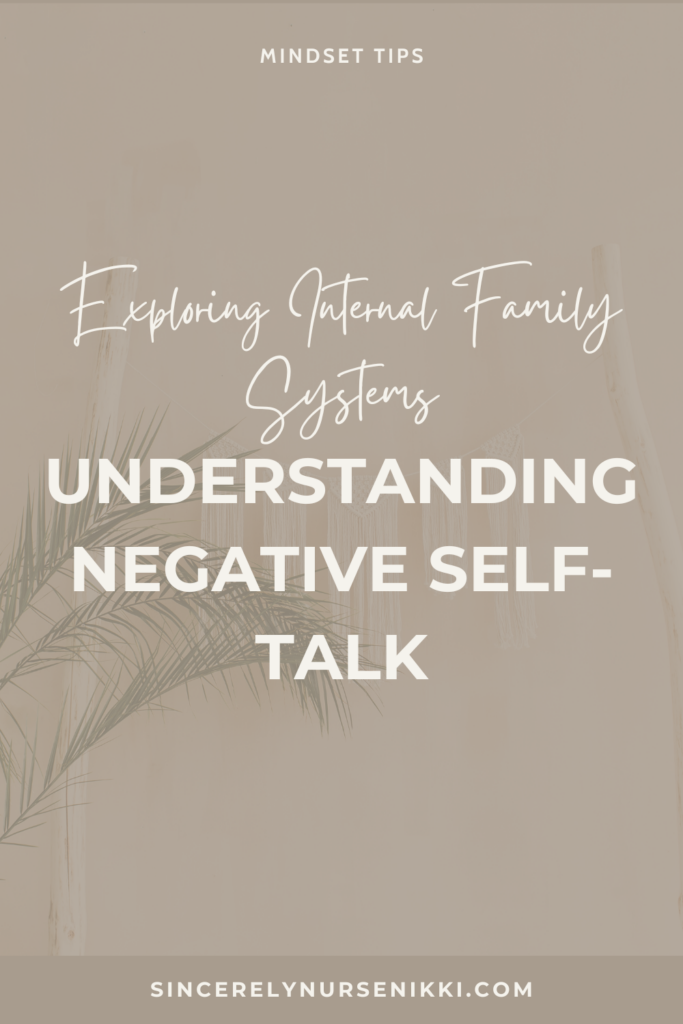Hey there,
I'm Nikki
read my story!
This is my digital space where I offer guidance on how to cultivating a healthy mindset, inner healing, nervous system regulation strategies, and alignment as the pathway to real and lasting abundance.
Relationship Empowerment & Self-Security Expert
Join my monthly empowerment calls
sign up below and access all previous recorded masterclasses.
I'm IN!
Negative self-talk can be a pervasive force in our lives, influencing how we perceive ourselves and interact with the world around us. It’s that inner dialogue that often veers towards self-criticism, doubt, and harsh judgments. However, understanding the origins and dynamics of this negative self-talk can lead to profound insights and opportunities for healing. One framework that offers valuable insights into the theory of Internal Family Systems (IFS) therapy.

What is Negative Self-Talk?
Negative self-talk is the internal dialogue or narrative we engage in, which tends to be self-deprecating, critical, and undermining. It often manifests as thoughts such as “I’m not good enough,” “I’ll never succeed,” or “I’m unworthy of love.” These thoughts can stem from various sources, including past experiences, societal influences, and internalized beliefs.
Negative self-talk can have significant impacts on our mental health, self-esteem, and overall well-being. It can contribute to feelings of anxiety, depression, and low self-worth, ultimately hindering our ability to thrive and achieve our goals.
Understanding Internal Family Systems (IFS):
Internal Family Systems (IFS) therapy, developed by Dr. Richard Schwartz, offers a unique perspective on the nature of the human psyche. According to IFS, our minds are comprised of various “parts” or subpersonalities, each with its own thoughts, emotions, and motivations. These parts can be categorized into three main types:
- Managers: These parts often take charge of protecting us from harm by setting rules, standards, and expectations. However, they can also be responsible for enforcing negative self-talk through perfectionism, self-criticism, and rigidity.
- Firefighters: These parts emerge in response to emotional distress or trauma and seek to distract or numb us from painful feelings through behaviors such as addiction, overeating, or self-harm.
- Exiles: These are the wounded or vulnerable parts of ourselves that hold painful memories, emotions, and beliefs. They are often hidden or suppressed by the managers and firefighters to avoid re-experiencing past pain.
How IFS Addresses Negative Self-Talk:
IFS therapy aims to facilitate harmony and healing within the internal system by fostering self-awareness, compassion, and understanding. Through the therapeutic process, individuals learn to identify and communicate with their various parts, recognizing that each serves a protective function, albeit sometimes maladaptive.
In addressing negative self-talk, IFS encourages individuals to approach their critical parts with curiosity, empathy, and nonjudgment. By understanding the underlying fears and intentions behind these parts’ behaviors, individuals can develop a more compassionate relationship with themselves and work towards integrating and healing these wounded aspects.
Practical Strategies for Transforming Negative Self-Talk:
- Mindfulness: Cultivate awareness of your thoughts and emotions without judgment. Notice when negative self-talk arises and gently redirect your focus to the present moment.
- Self-compassion: Treat yourself with kindness and understanding, as you would a dear friend facing similar challenges. Practice self-soothing techniques and affirmations to counteract negative self-talk.
- Dialogue with your parts: Engage in inner dialogues with your critical parts, acknowledging their concerns while also expressing your desire for healing and growth. Validate their intentions while gently challenging their rigid beliefs.
- Seek support: Consider seeking guidance from a qualified therapist trained in Internal Family Systems therapy or other modalities that address negative self-talk and self-esteem issues.
Recap:
Negative self-talk can be a formidable adversary, but it’s not an insurmountable one. By incorporating principles from Internal Family Systems therapy, we can begin to understand and transform the underlying dynamics of our internal dialogue. Through compassion, self-awareness, and integration, we can cultivate a more nurturing relationship with ourselves and pave the way for profound healing and personal growth. Remember, you are not defined by your negative self-talk; you are a complex and multifaceted being deserving of love, acceptance, and understanding.
Leave a Reply Cancel reply
With personalized support and Nikki’s Breakthrough Expansion System, you’ll build self-trust, deepen self-worth, and create the life you’ve dreamed of.
1:1 90 Day Accelerator Package
Gain momentum and get unstuck. I'll help you gain clarity and make progress on what matters most to you over the next 30 days.
1:1 30 Day Momentum Package
Create a clear path forward. Expect personalized breakthroughs and actionable strategies to help you feel aligned and confident.
1:1 Hourly Session
Where to start?
My offerings are designed to meet you where you are and guide you to your next breakthrough:
©SINCERELY, NURSE NIKKI LLC. 2024 all rights reserved
Terms • Privacy Policy • Disclaimer • Refund Policy
